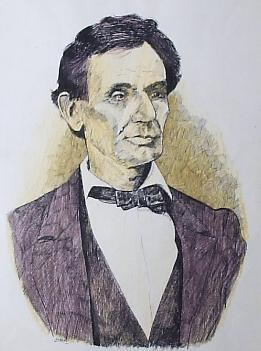Oh, why should the spirit of mortal be proud?
Like a swift-fleeting meteor, a fast-flying cloud,
A flash of the lightning, a break of the wave,
He passes from life to his rest in the grave.
The leaves of the oak and the willow shall fade,
Be scattered around, and together be laid;
And the young and the old, the low and the high,
Shall molder to dust, and together shall lie.
The infant a mother attended and loved;
The mother that infant's affection who proved;
The husband, that mother and infant who blessed;
Each, all, are away to their dwelling of rest.
The maid on whose cheek, on whose brow, in whose eye,
Shone beauty and pleasure - her triumphs are by;
And the memory of those who loved her and praised,
Are alike from the minds of the living erased.
The hand of the king that the sceptre hath borne,
The brow of the priest that the mitre hath worn,
The eye of the sage, and the heart of the brave,
Are hidden and lost in the depths of the grave.
The peasant, whose lot was to sow and to reap,
The herdsman, who climbed with his goats up the steep,
The beggar, who wandered in search of his bread,
Have faded away like the grass that we tread.
The saint, who enjoyed the communion of Heaven,
The sinner, who dared to remain unforgiven,
The wise and the foolish, the guilty and just,
Have quietly mingled their bones in the dust.
So the multitude goes - like the flower or the weed
That withers away to let others succeed;
So the multitude comes - even those we behold,
To repeat every tale that has often been told.
For we are the same that our fathers have been;
We see the same sights that our fathers have seen;
We drink the same stream, we feel the same sun,
And run the same course that our fathers have run.
The thoughts we are thinking, our fathers would think;
From the death we are shrinking, our fathers would shrink;
To the life we are clinging, they also would cling -
But it speeds from us all like a bird on the wing.
They loved - but the story we cannot unfold;
They scorned - but the heart of the haughty is cold;
They grieved - but no wail from their slumber will come;
They joyed - but the tongue of their gladness is dumb.
They died - aye, they died - we things that are now,
That walk on the turf that lies over their brow,
And make in their dwellings a transient abode,
Meet the things that they met on their pilgrimage road.
Yea, hope and despondency, pleasure and pain,
Are mingled together in sunshine and rain;
And the smile and the tear, the song and the dirge,
Still follow each other, like surge upon surge.
'Tis the wink of an eye - 'tis the draught of a breath -
From the blossom of health to the paleness of death,
From the gilded saloon to the bier and the shroud
Oh, why should the spirit of mortal be proud?

